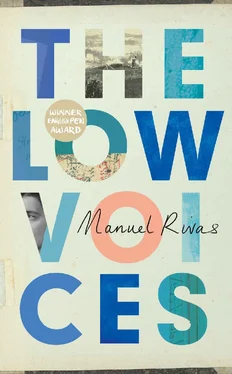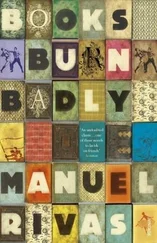One day, he heard a deafening roar in the sky. It was a twin-engine aircraft, descending right next to the trees. It looked as if it were about to land on top of them. My father said it was so close he could see the pilot’s face. A kind of time in suspense. He looked at the pilot and the pilot looked at him. One of the cows was curious to see the pilot’s face as well. My father’s head was raised, so the cow did the same. The tip of a horn collided with a dimple in his lower jaw. Leaving a shapely scar.
When he was older, there were women who remarked that a scar like that made a man more interesting. They asked him how he’d made that dimple, which was in the manner of Robert Mitchum. And my father replied, with historical precision, ‘It was somewhere between a cow and a plane!’
5. Come Back When You Step on the Sun
HE WAVES NOSTALGIA away, like a fly from his face. My father says, I can hear him now, ‘You thought you had the animal tied, but it was the animal who had you tied.’
That business of pasturing the cows was something common to the childhood of all my parents’ generation. Everybody, uncles and aunts, herded cows and sheep at some time. Unending days, tied to the animal. It’s not a metaphor. The small size of the properties, the concern about crossing boundaries, the fear the animal might suddenly take off, startled by a sting or a sound or a shadow in the suspicious world of the mountain. This meant you had to keep it tethered by a rope. And the rope acted as a bitter restraint on the person in question. Sunk in thought next to the grazing cow. My mother found pasturing the cows to be a nightmare. But especially the terror of having to go with Yellow. All cows that have recently given birth respond to the calls of their calves. But Yellow responded to all the calls of all the calves, whether or not they were her own. And she didn’t just respond with a mother’s moo, that cry that sends a shiver through the grass and propels clouds forwards. She started running, dragging the girl with her, until the girl let go of the rope and the cow went leaping over walls and hedges in search of the call. The next day, my mother would try taking her as far away as possible, leading her down deep tracks to the other side of the mountain. Until she thought she was in another world, in another bell jar, where the noises and sounds of Corpo Santo couldn’t reach. But someone once said eloquence is in the ear of the listener. Wherever she went, the cow heard a calf calling to her. Until one day the girl decided she wasn’t going to keep the rope holding Yellow taut. What’s more, she wasn’t even going to look at her. She wished she had a slate to write on. A book of saints to read. She could do it on the ground: write, draw a few scribbles, with a stick. They glanced at each other, she and Yellow. What she drew on the ground, when you looked at it, could have been a cow. The other, the real one, was calm today, enjoying the grass. About time. The girl thought about something she’d heard the previous night. How a cow can feed her calf even after she has died. She keeps a trickle of milk going for a whole day. How old are you, Yellow? How many children? When I was born, you were already here. They said then you were capricious. Don’t deny it.
It was good to talk to the cows. To know how to talk to them. It was good for the animals. And good for the humans. For cowgirls, it was a way of killing time, loneliness, fear. And irritation. Carme got over her fear of the mountain with an errand her father gave her. She had to take a bundle of bread and food. She had to leave it on a rock, in a crevice. Who’s it for? That doesn’t matter. It’s for someone who needs it. If you’re stopped by the guards, all you have to do is say, ‘It’s mine.’ Not another word. Another day, she took a jug of milk. When she came back the following day, the jug was empty. Poor people, not only were they invisible, but they were also hungry. Going back to cows, it was easy to run out of patience, truth be told. One day, a storyteller named Xan das Bolas came to the dance hall in Tabeaio. He was already famous for his roles as a nightwatchman and a civil guard in several films. He can’t have been a bad comedian, since in a sequence of Historias de la radio he played the role of a sergeant in the civil guard, being hoisted onto people’s shoulders. The day after his stellar performance in Tabeaio, it was the turn of Pepa, my mother’s younger sister, to pasture the cows. And she addressed them. She gave them a courageous speech. No muttering under her breath, no sweet nothings.
‘I’m going to be a bohemian!’
It was a strange word, waiting for its turn, and this is why it came out so naturally. From Dona Isabel’s factory of synonyms for naming the forbidden, perhaps.
‘I’ve had enough of you!’ shouted Pepa in her discourse to the cows. ‘I’m going to be a bohemian. And a film star. I’m going to elope with Xan das Bolas!’
Pepa must have been about eight. Her discourse reached the ears of Dona Isabel, who had an extraordinary information service. This Dona Isabel was the parish priest’s niece and lived with him in the Big House in Corpo Santo. Next to it was the small, humble abode of the Barrós family, bursting with children. Eight of them managed to survive, four girls and four boys — whichever way you looked at it, a lot of mouths for a widower. So Dona Isabel formed a kind of protectorate for them, albeit provisional and open to the whims of fate. It would seem my mother, Carme, was her favourite. Because she was quiet. This was true. My mother was quiet because she talked to herself. And was never a bother. When she wasn’t working, she would shut herself up in the attic to read the lives of saints. She would enter that dark chamber and seek a ray of light between the tiles to feed her clandestine happiness: the literature of lives that were extreme, unusual, radical, extraordinary. They may have been saints, but what she read — or the way she read them — was the lives of unrestrained, bewitching women, and strange men with ‘wind in their branches’.
Carme was never a problem. She did her work without complaint. She went from the cowshed, from milking the cows, to the attic with her saints.
What Pepa had said, however, was very worrying. She was the smallest, and she’d stood gazing at the road and talked about leaving.
‘She said she was going to elope with Xan das Bolas!’ shrieked Dona Isabel to my grandfather.
‘With Xan das Bolas?’
She was an enigmatic woman, as devout as she was romantic, as repressed as she was passionate. She felt drawn towards my grandfather and at the same time obliged to stay away. God had been considerate towards her, but had not equipped her with the grace of humour.
‘A little girl’s joke,’ said my grandfather. ‘Don’t give it importance.’
But she was used to ruling. Her own life, and the lives of others.
‘Even so, it would be better for the girl not to go with the cows anymore.’
Not far from Corpo Santo, in a place called Castelo, was another cowgirl, Manuela, who would later marry Francisco, one of my mother’s brothers. Francisco may have had worn patches on his trousers — he was a poor fellow — yet he was heavily contested in every household. In all the houses, there was a welcome and a seat for Francisco. Because Francisco, be he poor or not, was a gift. To start with, he could catch trout in the river by hand. And stories as well. By hand. As they flew past. He had various jobs, but this one, telling stories, kept him going. He worked in a shoe factory that belonged to the Senra family, a family with a long Republican tradition. It was later confiscated. He then became a barber.

Читать дальше













